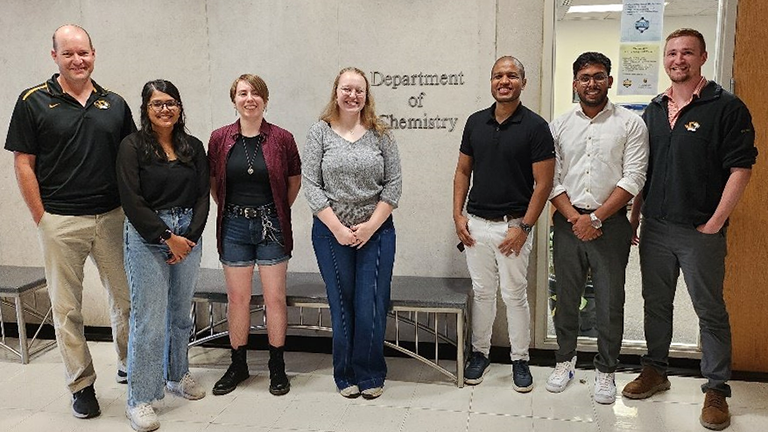Published on
Updated on

By Ryan Owens
Breakthroughs in energy and sustainability are the new frontier driving corporate research and development. Forward-thinking companies are partnering with major research universities in the nascent stages of potential technologies, and few have the combination of expertise and resources found at the University of Missouri.
Wesley Bernskoetter, Mizzou professor of chemistry, is a leading research partner for multinational companies pursuing these investments. Bernskoetter and his research team specialize in using chemical compounds to address the planet’s growing energy and natural resource challenges.
Fossil fuels power vehicles and machinery, but also create basic materials people use in everyday life. Plastics such as grocery bags, cups, toys, containers and more come from the same petroleum materials as gasoline. Finding new materials to make such items is a crucial way to produce efficiently, while preserving natural resources for energy production.
One of Bernskoetter’s notable early discoveries involves a chemical process that creates acrylic materials from carbon dioxide and ethylene. This breakthrough could lead to more affordable and sustainable production methods, replacing propylene with the cheaper and more widely available ethylene. Products like paints, diapers and more stand to benefit, showcasing the potential of the university’s partnerships with industry.
“Usually someone with partner companies has drawn up this route to utilize carbon dioxide, and they’re at the really early tech readiness or even concept stage,” Bernskoetter said. “If I put together carbon dioxide plus A, I get B, and B is really valuable, and it looks like it could make money and be more sustainable. … They may have great technical scientists, but the likelihood they have an in-house specialist or a team who can work on that problem is not really high. Especially if it’s a far-looking project for them.”
Mizzou provides access to top-level energy and materials researchers such as Bernskoetter. What makes the university attractive for partnerships is the combination of quality faculty such as Bernskoetter, plus the lab resources and the staffing necessary to make the process as smooth as possible. The planned Center for Energy Innovation will only add to the resources Mizzou can provide to partner organizations.
What the university gets in return includes opportunities for students to not only network, but also to receive real-world experience on projects relevant to the current moment. Additional benefits include access to technical resources and data academic researchers might not otherwise have.
The future of energy and the quality scientists needed to make it happen are being produced right here at the University of Missouri.
“Students work with people at these companies for many months or years, and they either often find out that they would be interested in having the student work for the company after graduation or at least they get a great degree or credibility for job applications at other corporate sites when they have letters of recommendation from these places,” Bernskoetter said.